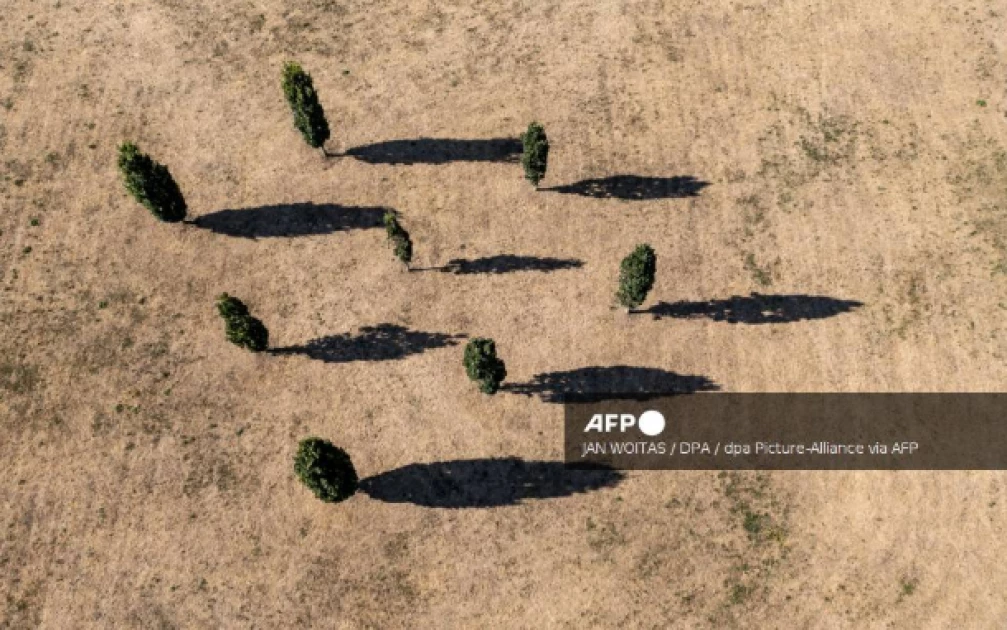Trump’s climate retreat sparks concerns, hopes for new negotiations by Africa

Eight oak trees cast their shadows on a dried-up meadow by Lake Zwenkau. (Photo by JAN WOITAS / DPA / via AFP)

Audio By Vocalize
In stamping his authority on his first day in office, Trump announced America’s withdrawal from the Paris climate accord in a move aimed at ‘putting America first’.
The decree came just days after the World Meteorological Organization (WMO) reported that 2024 has already recorded unprecedented high temperatures, surpassing the 1.55 degrees Celsius threshold outlined in the Paris Agreement, with concerns that this year could be even warmer.
Climate experts see Trump’s executive order as a direct threat to international efforts aimed at limiting temperature rise and mitigating the catastrophic impacts of climate change, particularly for the world’s most vulnerable nations.
Africa, which contributes less than 4% of global emissions, is advocating for a compensation package of $1.3 trillion.
However, this effort now faces significant setbacks following the U.S. exit, as the country is one of the world’s largest carbon emitters and bears historical responsibility for leading climate action. By abandoning its commitments under the Paris Agreement, the U.S. undermines years of hard-fought progress and sends a dangerous signal to the international community.
The removal of climate change references from the White House website, the promotion of fossil fuel projects, and the withdrawal from the Paris Agreement collectively threaten to erode the progress achieved under the United Nations Framework Convention on Climate Change (UNFCCC).
The situation continues to deteriorate in developing countries, which bear the brunt of climate change effects exacerbated by actions from the Global North.
Africa is already on the frontlines of the climate crisis, facing escalating droughts, floods, and extreme weather events that threaten lives and livelihoods, exacerbate food insecurity, and destabilize economies.
The withdrawal of U.S. leadership diminishes the critical financial and technical support needed to adapt to these challenges, leaving vulnerable nations to shoulder an unjust burden.
Furthermore, the new U.S. administration’s anti-green energy policies not only threaten to increase global greenhouse gas emissions but also risk locking the world into a future of unsustainable energy dependency. These actions contradict overwhelming scientific evidence that calls for immediate and drastic emissions reductions to secure a livable planet for future generations.
Despite the disappointment, the Africa Group of Negotiators (AGN) has expressed its commitment to collaborating with the United States and other nations to ensure that multilateralism remains the foundation for global climate action.
They urge the international community to reject isolationism and uphold the principles of multilateralism.
“Our world is in urgent need of climate action at all levels. While surpassing the Paris Agreement goal seems inevitable, bold and immediate steps must be taken by every nation. Even with the potential withdrawal of the United States from the Paris Agreement under the incoming regime—and hopefully not from the convention—the science remains unequivocal: climate change will continue to affect us all,” stated Joyce Kimutai, Climate Scientist at Imperial College London and the Kenya Meteorological Department.
Kimutai emphasized that vulnerable communities, which have contributed the least to this crisis, are bearing the heaviest burdens.
The increasing frequency and intensity of extreme weather events are eroding developmental gains and plunging countries further into debt.
Fred Njehu, a Pan-African Political Strategist for Greenpeace Africa, added, “Africa is a key player in the climate multilateral space, and this is not about to change. Climate change is a global problem that transcends national borders. Trump’s attempts to sabotage global efforts to tackle the climate crisis pose a significant threat to our future.”
Joab Okanda, a climate change and energy expert, called on Africans to view this moment as an opportunity to unite, leverage their geopolitical strength, and transform vulnerability into resilience.
He urged the continent to lead the charge toward building a sustainable future by utilizing its strategic minerals and renewable energy resources.
“Trump’s readiness to exacerbate an already burning planet on his first day in office is a stark reminder that climate wreckers have not only secured a seat in the Oval Office but an entire couch, with a clear agenda to maintain the extractive colonial economic and geopolitical hierarchy,” Joab asserted.
Sierra Leone’s Environmental Minister, Jiwoh Abdulai, warned that climate-related disasters do not conform to political ideologies.
“We need continued multilateral commitment to collective action and the reduction of greenhouse gases, especially by countries with historical responsibility for GHG emissions,” Jiwoh stated.


Leave a Comment